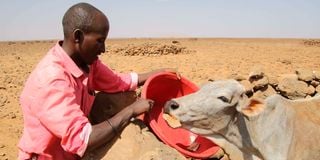Global solidarity needed to resolve drought crisis

Wato Dambala feeds one of his cows on pieces of carton due to lack of pasture in Tigo village, Marsabit County, on February 10, 2023. More than 300,000 are in urgent need of food.
This is not a commentary but an urgent appeal, call to action, call to solidarity by the global community. The situation in Marsabit County and other parts of Northern Kenya is dire, and it is time to pull resources to address the unfolding humanitarian crisis.
With the failure of five successive rain seasons and the high temperatures, residents in this area are already distressed, and the situation is only getting worse. I dare say, the devastating famine situation in Northern Kenya is one of the most pressing humanitarian crises facing the country at the moment. The prolonged drought, coupled with the effects of locust invasions and the Covid-19 pandemic, have taken a severe toll on the already distressed residents.
The impact on the livestock industry has been particularly devastating, with close to Sh10 billion worth of livestock already lost in Marsabit County alone between October 2022 and January 2023.
The latest data by National Drought management Authority reveals that 122,780 cattle, 535,972 goats, 511,054 sheep and 82,841 camels have perished during the period.
The few herders trying to salvage their animals are facing a significant challenge as the price of animals in the market has dropped by more than 50 per cent. Additionally, following the total crop failure, food prices have increased by more than 60 per cent, pushing them out of reach for most of the residents. At least 309,000 residents are food insecure, with the number of those in need rising every day.
The drought has also had a severe impact on the nutrition of children in the region. The milk yield from the animals has dropped significantly, and more households are relying on processed milk. However, the majority, who cannot afford to buy, are doing without milk and other nutritious food.
The county governments, national government agencies, and other partners such as USAID Nawiri are doing their best to help the affected residents. The Marsabit County government has suspended most programmes to focus on providing relief food and water. However, this is a drop in the ocean, and more resources are needed.
Veterinary services
We urgently require resources for livestock off-take and feed supplements programmes, water provision and veterinary services, all estimated to cost more than Sh3 billion.
The education sector is also greatly impacted, with parents having no income to pay school fees. The Marsabit County government has increased the number of scholarship beneficiaries this year to mitigate. Other county governments in Northern Kenya have bursary and scholarship programmes.
However, many students in colleges and high schools who desperately need assistance are left out due to lack of resources. Those in primary school require a feeding programme to keep them in school.
There are growing threats of inter-community and intra-community conflict over resources. The wild animals too have been affected, which might lead to conflicts over resources.
We now require blanket interventions since the majority of the population are food insecure. The situation calls for more investment in research, more resources in rebuilding livelihoods. It will take several years for the affected communities to rebuild unless a lot of support is extended to them.
In the long term, the affected families require affirmative programmes to restore their livelihoods. Pastoralism in the manner we are used to might no longer be sustainable. Reliance on rain fed agriculture might not be feasible going forward.
Climate change has caused livelihood disruption and we need to look for the best way to adapt. Therefore, we need both short- and long-term interventions.
The situation calls for global solidarity and urgent upscaling of humanitarian interventions in Northern Kenya, some Rift Valley counties such as Turkana and Samburu, and parts of the Coast such as Lamu and Tana River counties.
We must prioritise this issue and allocate more resources to mitigate the effects of climate change.
The writer is the governor of Marsabit County and Chair of the Frontier Counties Development Council




